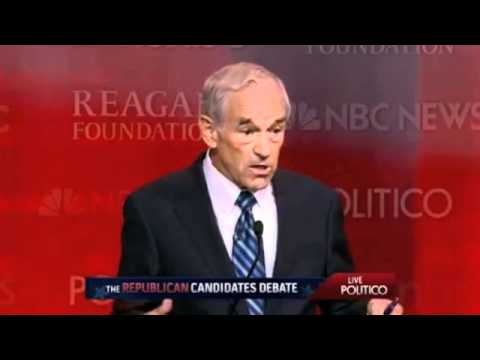As the Republican presidential primary race heats up, more people seem interested in Ron Paul than ever before, and Muslims are no exception. Many Muslims find Paul’s foreign policy and civil liberty positions attractive—so much so that some analysts even believe he could carry the Muslim vote. But upon closer inspection, Paul’s agenda has far less in common with Muslim interests than most people realize.
In his famous 2009 speech in Cairo, President Obama affirmed that “America and Islam are not exclusive” and promised to “fight against negative stereotypes of Islam wherever they appear.” His willingness to speak out this way generated a lot of excitement among American Muslims, who were also impressed by his criticism of the Iraq war and his promises to defend civil liberties. Muslims weren’t the only ones thrilled by the idea of having Obama in the White House, of course. Millions of Americans hoped he would provide a counterbalance to President Bush’s aggressive foreign policy and expansion of executive powers. But three years later, as Guantanamo’s prison stays open, drone strikes proliferate and the indefinite detention of terrorism suspects is codified into law, many voters are beginning to see Obama differently. In their eyes, the President has transformed from “a card-carrying civil libertarian” into “a disaster for civil liberties.”
This sense of disappointment is shared by many Muslims, but it isn’t clear how high of a priority it is for them. A June 2011 Pew poll found that 76% of American Muslims approved of Obama’s performance—far above the national average. Those who disapprove, however, may find Ron Paul to be an attractive alternative.
In addition to being the civil liberties champion par excellence, Paul has been a vocal critic of anti-Muslim bigotry. Braving the political consequences, he has rebuked everyone from Fox News host Sean Hannity to Republican Congresswoman Michele Bachmann for anti-Islamic fear-mongering. And when Obama equivocated about the “wisdom” of building an Islamic cultural center near Ground Zero in 2010, Paul spoke forcefully, saying that the controversy was “all about hate and Islamophobia.” Statements like this are a breath of fresh air for American Muslims, more than half of whom feel singled out by their government and fellow-citizens alike. The fact that Paul opposes the war in Afghanistan, calls for an end to drone strikes on terrorism suspects and criticizes U.S. policy toward Israel only adds to his appeal among them. But this is only half of the story.
While Ron Paul’s views on civil liberties and foreign policies may be attractive to American Muslims, his domestic policies should horrify them. Paul seeks to eliminate or decimate much of the federal government, but nearly 70% of U.S. Muslims “would rather have a larger government providing more services than a smaller government providing fewer services.” This position may be influenced by the way American Muslims interpret their faith-bound duty to provide support for the poor. Paul fundamentally rejects this model, and instead wants to minimize taxes and cut social welfare programs, leaving the poor and the sick at the mercy of the free market. According to him, for example, the federal government should not intervene to feed hungry children in public schools. If states “feel the obligation,” he says, they “have a perfect right to.”
Ron Paul’s crusade against federal standards even extends to the Civil Rights Act of 1964—the landmark piece of legislation that ended segregation and banned employment discrimination. Paul opposes the Civil Rights Act because, according to him, it “destroyed the principle of private property and private choices.” He argues that the federal government “has no legitimate authority to infringe on the rights of private property owners to use their property as they please and to form (or not form) contracts with terms mutually agreeable to all parties.”
What libertarians euphemistically call “private choices,” minorities often call “discrimination.” One-in-five American Muslims lists “discrimination, prejudice and unfair treatment” as their most pressing problem, and the Equal Employment Opportunity Commission (EEOC), is receiving more complaints of job discrimination from Muslims than ever before. In 2011 alone, the EEOC filed lawsuits on behalf of several Muslim women who suffered discrimination because of their headscarves. But if Ron Paul had his way, the EEOC would not exist (it was created to enforce part of the Civil Rights Act), and religious discrimination would be a perfectly legal “property right.” With over 40% of Americans viewing Muslims as an unimportant part of the religious community and out-of-step with American values, such a scenario would be disastrous.
If Muslims think that Paul is “their kind of Republican,” they should probably take another look at his domestic policies.
(Photo Credit: thinkprogress.org)
Peter Gray recently finished his BA in Asian Studies at Clark University with a special focus on Indonesia. A Muslim convert, he writes about Islam, “Islamophobia” and interfaith dialogue at muslimerican.wordpress.com.




